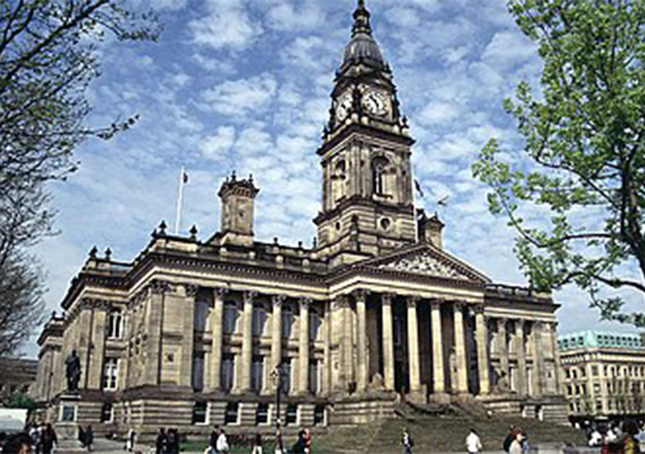Bolton

Bolton (/ˈbɒltən/ (About this soundlisten), locally /ˈboʊtən/)[2] is a large town in Greater Manchester in North West England, historically and traditionally a part of Lancashire. A former mill town, Bolton has been a production centre for textiles since Flemish weavers settled in the area in the 14th century, introducing a wool and cotton-weaving tradition.
The urbanisation and development of the town largely coincided with the introduction of textile manufacture during the Industrial Revolution. Bolton was a 19th-century boomtown and, at its zenith in 1929, its 216 cotton mills and 26 bleaching and dyeing works made it one of the largest and most productive centres of cotton spinning in the world. The British cotton industry declined sharply after the First World War and, by the 1980s, cotton manufacture had virtually ceased in Bolton.
Close to the West Pennine Moors, Bolton is 10 miles (16 km) north-west of Manchester. It is surrounded by several neighbouring towns and villages that together form the Metropolitan Borough of Bolton, of which Bolton is the administrative centre.
The town of Bolton has a population of 139,403, whilst the wider metropolitan borough has a population of 262,400. Bolton originated as a small settlement in the moorland known as Bolton le Moors. In the English Civil War, the town was a Parliamentarian outpost in a staunchly Royalist region and, as a result, was stormed by 3,000 Royalist troops led by Prince Rupert of the Rhine in 1644. In what became known as the Bolton Massacre, 1,600 residents were killed and 700 were taken prisoner.
Bolton Wanderers football club play home games at the University of Bolton Stadium and the WBA World light-welterweight champion Amir Khan was born in the town. Cultural interests include the Octagon Theatre and the Bolton Museum and Art Gallery, as well as one of the earliest public libraries established after the Public Libraries Act 1850.
Bolton is a common Northern English name derived from the Old English bothl-tun, meaning a settlement with a dwelling.[3][4] The first recorded use of the name, in the form Boelton, dates from 1185 to describe Bolton le Moors, though this may not be in relation to a dwelling.
It was recorded as Bothelton in 1212, Botelton in 1257, Boulton in 1288, and Bolton after 1307.[6] Later forms of Botheltun were Bodeltown, Botheltun-le-Moors, Bowelton, Boltune, Bolton-super-Moras, Bolton-in-ye-Moors, Bolton-le-Moors.[7] The town’s motto of Supera Moras means “overcome difficulties” (or “delays”), and is a pun on the Bolton-super-Moras version of the name meaning literally, “Bolton on the moors”.
The name itself is referred to in the badge of the Bolton Metropolitan Borough Council using a form of visual pun, a rebus, in combining motifs of arrow for ‘bolt’ and heraldic crown for ‘tun’, the term for the central high point of a defensive position that is the etymon of the suffix of Bolton.
